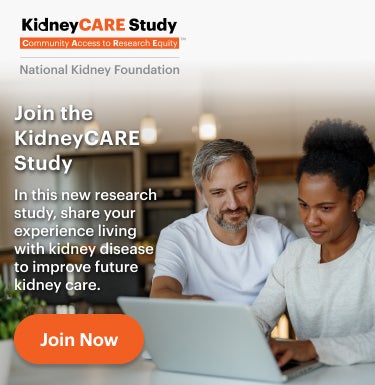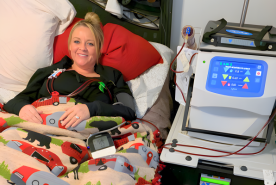Last updated: April 21, 2025
Medically reviewed by: NKF Patient Education Team
Some medicines can damage your kidneys. Many more are removed by your kidneys. Read more to learn about using medications safely when living with CKD.
Table of Contents
- About safe medication use with chronic kidney disease
- Pain medicines
- Antibiotics, Antifungals, and Antivirals
- Diabetes medicines
- Heart/Blood pressure medicines
- Anticoagulants (blood thinners)
- Upset stomach/antacid medicines
- Proton pump inhibitors (PPIs)
- Oral sodium phosphates (OSP)
- Lithium
- Questions for your healthcare team
About safe medication use with chronic kidney disease
Medications are a very important part of staying healthy, especially if you have chronic kidney disease (CKD). But all medicines bring some level of risk for side effects and other safety concerns. Some medicines can damage your kidneys. Many more medicines leave your body through the kidneys - so, they can build up in more advanced stages of CKD.
While some medicines should be avoided with CKD, many can be used safely at lower doses and/or with less frequent use. Working with your healthcare professional is important to make sure your medication regimen is safe for you and your specific health needs. Regular monitoring of your estimated glomerular filtration rate (eGFR) can help inform which medicine(s) may need to be adjusted and/or switched to something different.
To help guide these conversations between you and your healthcare team, a summary of the most common medications with potential safety concerns for people living with CKD is featured below.
Pain medicines
A common class of pain medicines known as “non-steroidal anti-inflammatory drugs” or NSAIDs can lower the amount of blood flowing to your kidneys. This can raise your blood pressure and cause kidney damage, especially with high doses and/or long-term use. Some examples include ibuprofen (Advil, Motrin), naproxen (Aleve), and aspirin (more than 325 mg per day).
Other medicines used for pain leave your body through the kidneys. So, they can start to build up in your body and cause extra side effects as your eGFR goes down. A lower dose and/or less frequent use may be recommended to balance the risks and benefits.
For information about using pain medicine safely with CKD, visit the NKF Pain Medicines and Kidney Disease resource.
Antibiotics, Antifungals, and Antivirals
Many medicines used to treat infections caused by bacteria (antibiotics), fungus (anti-fungals), or a virus (antivirals) leave your body through the kidneys. So, they can build up in your body and cause extra side effects if the dose is too high for your eGFR. Some can also cause kidney damage when there is too much in your blood. In most cases, the recommended medication can still be used – just at a lower dose or given less often. The risk of infection getting worse is usually higher than the potential side effects that may occur. In very high-risk cases, you may need to stay in the hospital so your health can be closely monitored.
If you have CKD and are prescribed medicine for an infection, always ask your healthcare professional if the dose is okay for your eGFR. They are most likely already checking this information for you, but it never hurts to double check for safety.
Diabetes medicines
Some medicines used to treat diabetes leave your body through the kidneys. So, they can build up in your body and cause extra side effects if the dose is too high for your eGFR. The most common examples include metformin (Glucophage), glyburide (Diabeta, Glynase), glimepiride (Amaryl), and all insulins.
A lower dose of metformin may be needed in early stages of CKD and generally avoided if your eGFR is below 30. Glimepiride and insulin can be used in all stages of CKD. But lower doses may be needed as your CKD progresses (eGFR goes down) since it will take longer for the medicines to leave your body, increasing your risk of low blood sugars. Glyburide should not be used when your eGFR is less than 60.
Heart/Blood pressure medicines
Some medicines used to treat high blood pressure and/or prevent heart disease can cause side effects that overlap with CKD complications. For example:
- ACE inhibitors/ARBs and finerenone (Kerendia) help treat albuminuria, prevent CKD progression, and lower your risk of cardiovascular disease (CVD). ACE inhibitors & ARBs also help lower blood pressure. But these medicines can increase the level of potassium in your blood. This can increase your risk of hyperkalemia (high levels of potassium in your blood).
- Spironolactone (Aldactone) or eplerenone (Inspra) can sometimes be added to help treat high blood pressure or heart failure if other medicines are not enough. But this medicine can also increase the level of potassium in your blood. This can increase your risk of hyperkalemia (high levels of potassium in your blood).
- Diuretics (also called “water pills”) help lower the amount of extra water in your body. Examples include furosemide (Lasix) and torsemide (Demadex). These can be very helpful for people with CKD and/or heart failure. But they can also cause dehydration (not enough water in your body) and/or low potassium levels if the dose is too high for your eGFR level.
These medicines are used often for people living with CKD because they are so helpful. But it is important to follow up regularly with your healthcare professional to make sure your treatment regimen is still working properly and continues to be safe for you.
Anticoagulants (blood thinners)
Blood thinners are often used to prevent blood clots for people who are at high risk of having one, including people living with atrial fibrillation (irregular heart rate). Some examples include warfarin (Coumadin), apixaban (Eliquis), dabigatran (Pradaxa), and rivaroxaban (Xarelto). These medicines leave your body through the kidneys. So, lower doses may be needed in CKD since it will take longer for the medicines to leave your body, increasing your risk for severe bleeding.
Upset stomach/antacid medicines
H2 blockers are a type of medicine used to lower the level of acid in your stomach. This can help treat conditions like heartburn (also known as GERD) and are sometimes used for stomach ulcers. These medicines are available over the counter or OTC, which means you can buy them without a prescription. Some examples include famotidine (Pepcid), cimetidine (Tagamet), and nizatidine (Axid). These medicines leave your body through the kidneys. So, they can build up in your body and cause extra side effects if the dose is too high for your level of eGFR. If you have CKD, check with your healthcare professional before using an H2 blocker to make sure it is safe and to confirm the right dose for you.
Antacids are another type of medicine that can be used for heartburn (GERD) or upset stomach. These are more commonly used for quick symptom relief (compared with an H2 blocker or proton pump inhibitor [PPI]). Antacids are also widely available over the counter (OTC) and usually contain one or more of the following ingredients: calcium, magnesium, bismuth, and aluminum. Examples of brand names include Tums, Mylanta, Pepto Bismol, Rolaids, and Gaviscon. All these ingredients can build up in the body in people who have CKD. Too much calcium can also lead to hardening of your blood vessels. So, check with your healthcare professional before using any of these products.
People with CKD should avoid any products containing aluminum as it can cause brain toxicity and there are safer options available.
Proton pump inhibitors (PPIs)
Proton pump inhibitors (PPIs) are a type of medication used to lower the level of acid in your stomach. This can help treat conditions like heartburn (also known as GERD) and stomach ulcers. They can also be used to prevent ulcers for people who are at high risk. The stomach needs acid to break down food and nutrients, but sometimes there is too much. Many people may only need short-term treatment (1-2 weeks), while others may need longer treatment (many weeks, months, or longer).
Some PPIs are available over the counter or OTC, which means you can buy them without a prescription. These include omeprazole (Prilosec OTC), esomeprazole (Nexium 24HR), lansoprazole (Prevacid 24HR) and omeprazole/sodium bicarbonate (Zegerid OTC). Others are only available with a prescription from your healthcare professional, including pantoprazole (Protonix), rabeprazole (Aciphex) dexlansoprazole (Dexilant), and higher doses of the OTC products.
Kidney-related side effects are not expected with short-term use (less than 2-4 weeks). But with longer use (many months or years), the risks are higher. Potential side effects include a higher risk of acute kidney injury (AKI), infection (especially in your digestive system), bone thinning (osteoporosis), and problems with absorbing important nutrients and minerals from your meals like iron, magnesium, and vitamin B12. These are especially important to be aware of if you also have anemia or mineral and bone disorder because of your CKD. For people without CKD, there appears to be an increased risk of developing CKD with long-term use of PPIs, although the connection is not clear.
The best way to lower your risk is to only use these products as recommended on the product labeling (only if you do not have CKD) or as recommended by your healthcare professional. People living with CKD should avoid using an OTC PPI without talking to their healthcare professional first. Talk with your healthcare professional about these risks and benefits to see how they apply to your personal situation.
Oral sodium phosphates (OSP)
Oral sodium phosphates (OSP) are sometimes used by people who need to prepare for a colonoscopy (colon cancer screening). They work by causing water from your body to move into your bowel to help flush it out (also known as osmotic agent). Example brand names include Visicol and OsmoPrep (although the brand name versions of these products are no longer on the market).
These products can cause kidney failure or worsen kidney damage in people with certain risk factors. So, these should be avoided by people who have CKD, are over 55, or take medicines that affect blood flow to the kidneys – including NSAIDs, ACE inhibitors/ARBs, and diuretics. If you have CKD and need a colonoscopy, work with your healthcare professional to develop a plan that is safe for you. One alternative is to use a polyethylene glycol (PEG)-based product.
Lithium
Lithium is a very effective medicine used to treat mania (frenzied, abnormally excited mood) in people with bipolar disorder. But it can harm the kidneys when used at higher doses or over very long periods of time (multiple years/decades).
The most common problem is nephrogenic diabetes insipidus – when your body has trouble concentrating urine (pee). This causes your body to remove large amounts of water in your urine and can make you very thirsty. Even though it has the word diabetes in the name, it is not related to the type of diabetes caused by high blood sugar (also known as diabetes mellitus). Lithium may also increase the risk of chronic kidney disease with very long-term use (also known as lithium nephropathy).
The best way to lower your risk for these problems is to work with your healthcare professional to find the lowest dose necessary to treat your condition. Using a once-daily (extended-release) version of lithium can help keep the level in your blood steady, which also lowers the risks. Your healthcare professional may also request bloodwork to measure the level of lithium in your blood to make sure it is safe.
Questions for your healthcare team
- Are my medicines safe for me to use with my CKD and are the doses safe for my eGFR?
- Your overall health changes over time. So, medicine(s) you started many years ago may no longer be as safe for you today. This is especially true if your CKD has progressed (eGFR has gone down). Asking this question can help make sure your healthcare team is reviewing your medication list often and comparing it with your eGFR level.
- If one or more of my medicines has a risk of harming my kidneys, what can I do to lower my risk?
- It is not always possible to avoid using certain medicines, like NSAIDs, lithium or PPIs. In these situations, it is important to maximize safety while minimizing risk. The best approach is different for each person, so having this conversation with your healthcare team can help ensure you get personalized advice.
- Are there any over-the-counter (OTC) medications I should avoid based on my CKD?
- Everybody’s CKD is different. So, while some medicines have very clear directions when to use or avoid, everybody has a different level of risk. Working directly with your healthcare professional is the only way to get advice that is customized just for you.
- What should I do if I need to use an over-the-counter (OTC) product that we haven’t discussed before?
- It’s not possible to plan for every situation. So, having a plan for what to do if you end up needing to take an OTC product for something like a headache, heartburn, or stomachache is important. Your healthcare professional may request you call the office, send a message in the patient portal, or consult a trusted reference.







